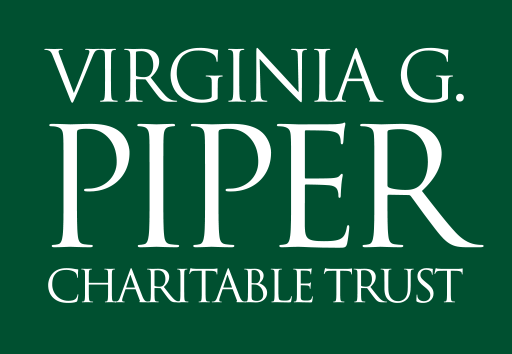
Grant Process

Piper Trust accepts grant proposals for efforts that continue Virginia Piper’s commitment to arts and culture, children, education, healthcare and medical research, older adults, and religious organizations in Maricopa County.
ELIGIBILITY
Funding eligibility is determined by following criteria:
- The effort must primarily serve Maricopa County.
- The applicant must have a current 501(c)(3) tax exempt status from the Internal Revenue Service or be a governmental entity. In addition, special rules apply to 509(a)(3)(Type III) organizations.
- The applicant organization must be in operation for at least three years from the effective date of its 501(c)(3) tax status.
PIPER 101
Prior to applying for a grant, the Trust strongly recommends that all new and prospective applicants attend a “Piper 101” information session to learn more about the Trust’s mission, grant opportunities, and how to develop a strong proposal.
Piper 101 sessions are held regularly throughout the year. Registration is required.
DEVELOPING A PROPOSAL
Grant proposals must align with the objectives and strategies within our six core program areas. Our staff is eager to engage with potential grantees to provide insight into the Trust’s funding priorities and shepherd proposals through our process step-by-step. The Trust strives to build relationships with nonprofits throughout the grantmaking process.
What Makes a Strong Proposal
In addition to close alignment with program guidelines for each core area, strong grant proposals also demonstrate the following:

Impact — Identifying a need, such as:
- Improving service delivery
- Expanding the scope or scale of existing programs
- Collaborating with other agencies
- Testing pilot concepts that may have broader applicability
- Emphasizing prevention or early intervention

Effectiveness — Demonstrating value and efficacy:
- Addressing identified needs
- Incorporates knowledge or evidence of measures that work
- Offering measurable observable outcomes (effects on the lives of children, older adults, or arts and culture institutions)

Feasibility — Proving practicability:
- Uses methodology appropriate to address issue
- Manageable with available resources
- Demonstrating sufficient organizational leadership to achieve program goals

Sustainability — Practicing fiscal responsibility:
- Requesting an appropriate amount to the size of the agency's budget
- Having access to stable or diverse finances
- Offering a thoughtful, realistic plan for continuing the project beyond the term of the grant period
Recommended Best Practices
Virginia G. Piper Charitable Trust’s Board of Trustees believes that public trust and accountability are fundamental to a nonprofit’s legal, ethical, and fiduciary responsibilities. As such, Piper Trust strongly recommends these essential best practices:

Form 990
The full board (or audit committee if one is in place) reviews the nonprofit’s Form 990 tax return before submission.

Audit or Financial Review
An organization with $5 million or more in annual revenue should have an independent annual audit and should establish an audit committee with appropriate skill and experience in finance or accounting. Nonprofits with annual revenue between $2 million and $5 million should have financial statements reviewed by an independent certified public accountant.

Conflict of Interest
Nonprofit organizations should adopt and enforce a strict conflict of interest policy that outlines procedures for routine disclosures by staff and board.

Executive Performance and Compensation
Nonprofit organizations should adopt a written policy establishing the review of performance and compensation of the executive. A designated board committee should perform an annual review of the executive’s performance and relevant compensation comparison; however, the full board should approve any change in the executive’s compensation.

Board Composition
The nonprofit board should have at least three voting members who are independent. Boards with more than three voting members should maintain the independence of at least one-third of the voting membership.

Whistleblower Policy
Organizations should establish policies and procedures that encourage individuals to come forward with credible information about illegal actions or violations of adopted policies. The policy should apply to staff, board, and volunteers.
See Independent Sector’s Principles for Good Governance for more information on financial oversight, legal compliance, and effective governance.
APPLICATION PROCESS
Letter of Inquiry
After consultation with the Trust’s program staff, organizations may be invited to complete an interest form and brief letter of inquiry to summarize the proposed project, budget, and timeline. This step in the process serves to establish the basic elements of the proposal and helps staff to identify any areas of misalignment with the Trust’s priorities and guidelines. Staff work in a collaborative manner and apply many perspectives to each inquiry received. An assigned program officer will synthesize all feedback and provide guidance or seek additional information.
Full Proposal
If approved, organizations are then invited to submit a full proposal, including: a detailed project narrative, project budget, audited financials (three years), year-to-date internal financial statements, board-approved organizational budget, organizational chart, information about the Board of Directors, donors, and other sources of support. Staff works directly with applicants to ensure all necessary elements are in place to present the proposal to the Trustees.
Board of Trustees Review
Program staff present proposals and make recommendations at monthly Board of Trustee meetings. Trustees review all proposals and approve or decline grant requests on an ongoing basis. Trustees generally make a final decision at the time of the presentation, and staff will typically notify applicants of their decision immediately.
ORGANIZATIONAL GUIDELINES
To provide the greatest community impact and ensure clear communication within large organizations, the Trust has established these guidelines by organization type:
- Universities: Individual colleges, schools, research units, and departments should coordinate their inquiries through the President’s Office.
- Hospitals: All requests should be coordinated at the regional level. The Trust will not entertain requests from individual network members or locations.
- Branch-based Community Organizations: The head executive should determine the organization’s priorities. The Trust does not entertain requests from individual branches and campuses.

